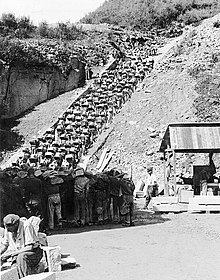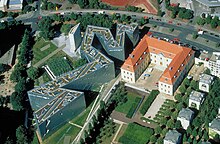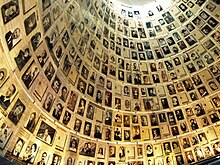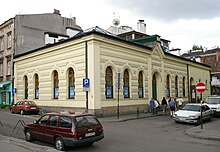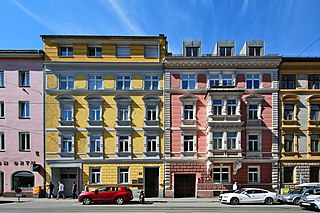
Innsbruck is the capital of Tyrol and the fifth-largest city in Austria. On the River Inn, at its junction with the Wipp Valley, which provides access to the Brenner Pass 30 km (19 mi) to the south, it had a population of 132,493 in 2018.

Andreas Maislinger is an Austrian historian and political scientist and founder and former chairman of the Austrian Service Abroad. He also is the founder of the Austrian Holocaust Memorial Award, the Braunau Contemporary History Days and the inventor of the idea of the House of Responsibility.

The Austrian Service Abroad is a non-profit organization funded by the Austrian government which sends young Austrians to work in partner institutions worldwide serving Holocaust commemoration in form of the Austrian Memorial Service, supporting vulnerable social groups and sustainability initiatives in form of the Austrian Social Service and realizing projects of peace within the framework of the Austrian Peace Service. The Austrian Service Abroad is the issuer of the annually conferred Austrian Holocaust Memorial Award.
The Austrian Social Service is part of the Austrian Service Abroad founded by Dr. Andreas Maislinger in 1998. It offers the possibility to substitute the compulsory military service in Austria with a 10-months service abroad and provides a platform for volunteering services.
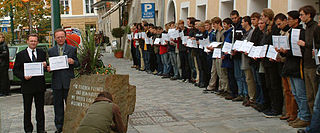
The House of Responsibility (HRB) in Braunau am Inn is the idea of establishing an international meeting place and a place of learning in the birth house of Adolf Hitler. People from all countries, backgrounds, religions and cultures should meet in order to discuss, learn and develop projects revolving around the concept of responsibility relating to the dimensions of past, present and future. The main demography shall be young people. The idea for a House of Responsibility originates from the founder of the Gedenkdienst and chairman of the Austrian Service Abroad Dr. Andreas Maislinger.
The Austrian Peace Service is one of the three sections of the non-profit organisation Austrian Service Abroad and offers a 6-12 months voluntary service at its partner institutions. Male Austrians may accredit their Austrian Peace Service as an alternative to the Austrian national or military service, provided their service abroad lasted a minimum of 10 months. Austrian Peace Servants are financially supported by the Austrian government.
Andreas Hörtnagl is an Austrian politician.

The Austrian Holocaust Memorial Award (AHMA) was founded by the Austrian Service Abroad in 2006.

The Fondation pour la Mémoire de la Déportation was founded on 17 October 1990 on the initiative of French Prime Minister Michel Rocard and the former Minister of the Interior. It is based in Paris.
The Action Reconciliation Service for Peace is a German peace organization founded to confront the legacy of Nazism.

The Auschwitz-Birkenau State Museum is a museum on the site of the Nazi German Auschwitz concentration camp in Oświęcim, Poland.
Michael Prochazka is an Austrian social scientist and economist and vice-chairman of the Austrian Service Abroad.
Walter Guggenberger is an Austrian civil servant and politician (SPÖ). From 1983 to 1999, Guggenberger was a member of the National Council of Austria.
Herbert Rosenkranz was a Jewish historian.
The Russian Research and Educational Holocaust Center was founded in 1992 in Moscow and has since then been working on awareness raising of the Holocaust in the Russian society. It is the only non-governmental organization in the Russian Federation, devoted to the study of the life of Soviet Jews during the Great Patriotic War.
The International Youth Meeting Center in Oświęcim/Auschwitz is an educational institution whose campus lies between the center of the Polish city of Oświęcim and the former German concentration camp of Auschwitz. More than one million persons, mostly Jewish and Polish, were murdered at Auschwitz during the Second World War (1939–1945). Proposed in 1971, the center was opened in 1986 following years of planning, negotiations, and fundraising. It seeks to "develop the understanding of National Socialism and its consequences, particularly among young Germans, through dialogue and encounter between people of different origins", and is particularly engaged with Germans and Poles, Christians and Jews. In 2010, the Center hosted more than 17,000 overnight stays by youth groups participating in its programs. Many young Germans and Austrians have held year-long voluntary positions at the Center that satisfy their civilian service (Zivildienst) responsibility. One of these, Robert Thalheim, wrote and directed the German-language dramatic film And Along Come Tourists (2007) that features the center and its activities.
The Zivildienst is the most common mandatory alternative service for conscientious objectors of the national military service in the Austrian Armed Forces. Officially called Zivildienstleistender (ZDL) or Zivildiener it is common to call them Zivi. Since 1975, drafted men may refuse the military service on conscientious reasons and serve in the compulsory alternative community service instead. This generally involves work in social services like hospitals, youth organisations, nursing homes, rescue services, emergency medical services, and care of the disabled. The service usually lasts nine months. About more than 40% of the drafted male citizens in Austria choose this option by declaring a conflict of conscience. There is no conscription for women, therefore women are not obliged to serve as a Zivi, which is just a substitute for the still existing mandatory military service.
The Austrian Mauthausen Committee is responsible for scientific and educational work concerning the Mauthausen-Gusen concentration camp and its satellite camps in Austria. This association was founded in 1997 and is the subsequent organisation of the Austrian Concentration Camp Community Mauthausen.
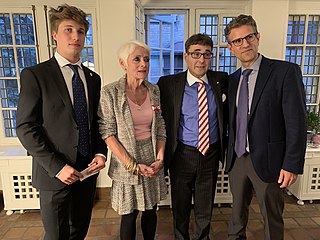
Naomi Kramer is a Canadian curator and president of the Holocaust Education and Genocide Prevention Foundation.




